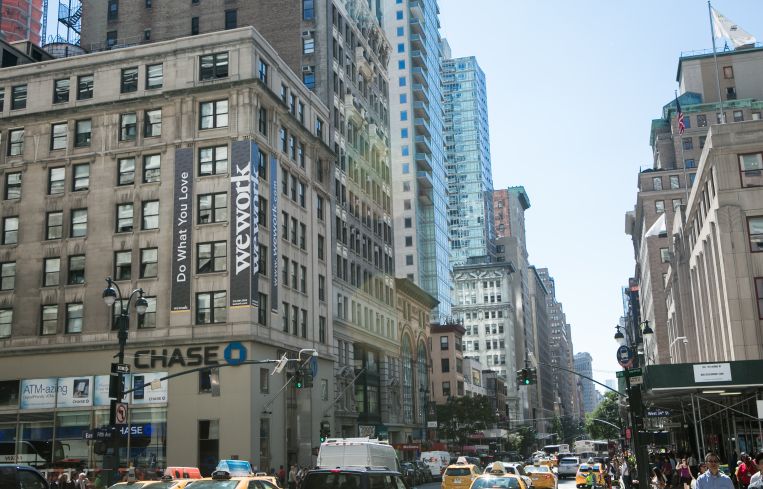Coworking Leasing Activity Increased by 200 Percent Last Year in Manhattan: Report
By Nicholas Rizzi January 15, 2019 6:43 pm
reprints
Coworking and flexible workplace companies had a surge in leasing activity last year, increasing by 200 percent from the year before, but experts don’t expect that stratospheric growth to continue.
Leasing activity for coworking firms accounted for 18 percent of all deals in 2018 in Manhattan, with 111 leases signed, a significant increase from the 6 percent it comprised in 2017, according to a year-end CBRE report released today. The sector previously held steady at 6 percent since 2015. (Statistics exclude coworking deals done on a management basis.)
“We’re seeing just a tremendous explosion in the amount of leasing activity among coworking and other flexible space operators,” Nicole LaRusso, the director of research for the tri-state region at CBRE, said during a press briefing today, adding that most of the space leased by the sector is occupied. “It’s just really becoming a substantial amount of our market,” she said.
The surge led Cushman & Wakefield to dub 2018 the “Year of the Coworking/Flex Office Sector” in its 2018 outlook released yesterday. The C&W study found that coworking companies leased around 4.5 million square feet in Manhattan last year, by WeWork and Knotel.
However, C&W analysts don’t expect coworking’s massive growth to be able to continue in 2019, but aren’t too worried about a downturn if WeWork and others fail because their market share only makes up around 3 percent of the total office market in Manhattan, with 13 million square feet.
“I don’t think 4.5 million per year is sustainable, but it is something that we’re watching closely,” Richard Persichetti, C&W’s vice president of research for the tri-state region, said during an online presentation of the report.
“It’s big news with all the coworking leasing going on, but it’s a small section of our inventory,” Persichetti added.
A soon-to-be-released study from CBRE also found that buildings over-leveraged with coworking companies might fetch a lower price in the investment sales market compared with ones with less space dedicated to them. Buildings with about 40 percent leased to coworking companies should still be able to sell for similar prices to those without coworking, on a nationwide basis, but those with more than that will sell for less.
“If, and when, the capital markets deem coworking space to be at least equal value to the multi-tenanted space, that’s when it will be durable over the long term,” Spencer Levy, the head of research in America for CBRE, said at today’s briefing. “If that doesn’t happen, that’s when it’s always going to be in the minority, or smaller, position.”
Aside from the coworking surge, Manhattan saw its strongest year for office leasing in 2018 since 2000, with 32.4 million square feet leased, per CBRE’s leasing report.
That was largely driven by sizable relocations—more than 250,000 square feet per tenant—signed last year, including Deutsche Bank’s 1.12 million square feet at the soon-to-be-renamed Time Warner Center and Pfizer’s nearly 800,000 square feet at Hudson Yards.
But leasing velocity was not limited to super-sized deals.
As LaRusso said: “It’s really a very broad-based demand that’s pushing the market forward.”



